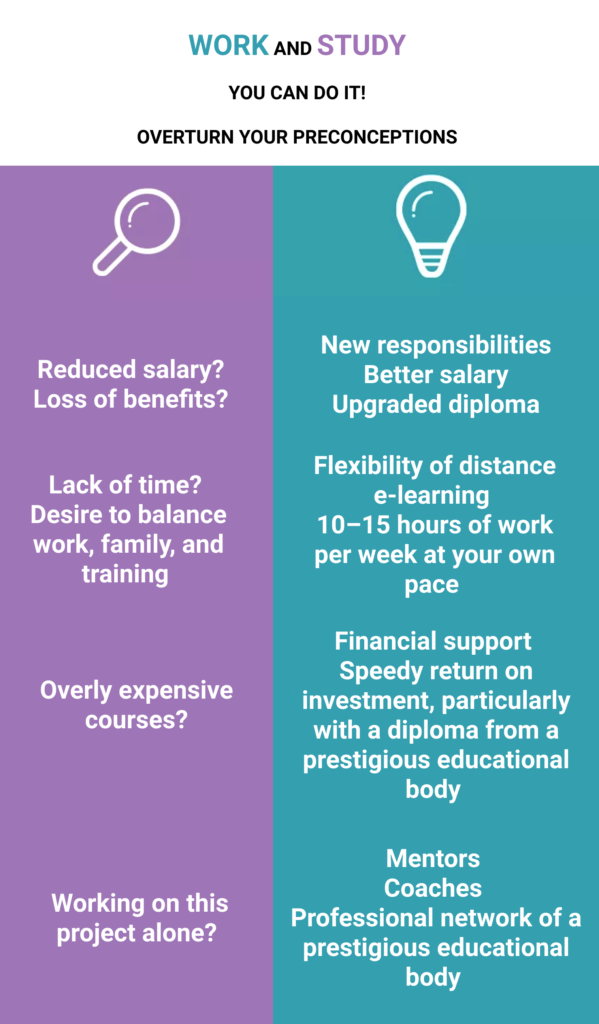Am I pursuing the career that I dreamed of at school? Have I progressed in my profession as quickly as I expected to? Did I picture working in the same job for my whole life? You are likely to have answered these questions with a “NO”. But there is no reason to despair: continuing professional development at 30, 40, or 50 — after having already begun your working career — is very much a possibility.

The job market is constantly changing. One profession falls back while another emerges, providing new career opportunities to be seized. With this in mind, start by taking stock of your professional aspirations: would you like to take on more responsibilities, gain new skills, or change career? Continuing education allows lifelong learning. Read on to find out how returning to education can help you to successfully navigate a change in your career.
Returning to education after having begun your working career: you can do it!
Reduced salary, loss of benefits, not enough time, overly expensive courses… “We know what there is to lose, but what is there to gain?” Contrary to this pessimistic thinking, you can become an agent of change in your own life by changing your career trajectory through training. After going back to education, learners have in fact:
- progressed to a better position with a salary increase ;
- benefited from return on investment via a new professional network
“I was very pleased with this course. I achieved the initial goals I set myself — I obtained my Level 1 Degree, I strengthened my pre-existing skills, and I built on them in the area of management control. In addition, thanks to individual coaching, I was able to embark on starting my own business, something which I wouldn’t have done if I hadn’t taken this management training course at EDHEC.”
Mathieu, Founder of Py Image(s)
Creating your professional development project: the questions to ask yourself
#1: Move up the ladder or switch paths?
Before you get started, review your professional ambitions and your hopes. What motivates you to go back to education? It will be easier to find the right course if you have identified the profession or sector in which you wish to work. There are professional training courses for every field: digital technologies, management, marketing, finance, and more.
I want to take on new responsibilities and I’m prepared to move to a new company.
> Direct your attention towards management and supervisory training courses. Make use of your Compte personnel de formation (CPF; a French continuing professional development programme).
I want to change jobs but not companies.
> Aim for courses which will provide you with new expertise, allowing, for example, horizontal career growth from the legal department to sales management. Your company’s skills’ development plan can be used to take on this training.
I want to retrain for a new career.
> First, research the necessary qualifications and check whether any others are considered to be equivalent. A Professional Transition Project (PTP; formerly Individual Training Leave [Congé individuel de formation]) is the best choice in this case.
I want to gain new skills in order to start my own business.
> Take advantage of the support for start-ups or acquisitions provided by ACCRE, after mutually agreeing termination of your employment contract with your employer.
#2: Finance your training
Taking a course is an important decision which will have an impact on your professional development. Opting for distance learning allows you to retain your current position and pay level.
To meet the costs of your training, there are financial support programmes tailored to every learner profile. To find out how to finance your training, consult our thorough guide.
#3: Secure a new diploma
Your employer already values your professional experience: obtain a diploma of the corresponding level with a Validation of Professional Experience. With EDHEC’s Manager Programme, for example, you will obtain a “Titre de Niveau 7″ (Level 7 Degree, formerly known as a Level 1 Degree and equivalent to a master’s degree [BAC+5]) after one year of study.
Some training courses also accept those with no formal higher education. However, they may constitute skills training rather than being diploma courses. In this case, they do not provide a diploma when completed.
If you hold a master’s-level qualification, some diplomas and certifications can be accessed via transfer scheme when returning to education.
#4: Find the time to study and choose the right format
You should make sure that you are ready for the new schedule which your return to education will entail. A distance learning management training course requires 10 to 15 hours of work per week.
This workload can be divided up in various ways: with evening classes, distance learning, e-learning, and varying degrees of face-to-face time. Find out whether these new formats work for you by signing up for a MOOC (Massive Open Online Course).
And prepare to reorganise your daily life. With this in mind, it is important that those around you are on board with and supportive of your plans.
Most of the graduates of EDHEC’s online Manager Programme took the course alongside their working responsibilities, studying in the evenings and at the weekend. Read their testimonials here.
#5: Activate your network and seek outside opinions
If you are pursuing a career change, try to put yourself in the shoes of someone in your target career as he or she carries out the daily tasks of the job. Do not hesitate to reach out to former colleagues and classmates who might be able to provide you with a more detailed description of the position.
Prepare for your move into this new sector by building a professional network. LinkedIn is a powerful tool for creating a high-quality network and looking for openings.
#6: Choose the recognition associated with a prestigious school
To ensure that your investment is worthwhile, select a teaching body offering solid guarantees:
- international accreditations (AMBA, AACSB, EQUIS) ;
- recognition in France and abroad through rankings of premium educational bodies
- business outreach through a strong alumni network
After researching online, arrange meetings with the training bodies which interest you. To do this, make a telephone appointment, participate in an open day, or attend an introductory webinar.
Returning to education after having begun your working career is the best way to ensure that you will obtain a position in which you will be truly fulfilled, or even find a new vocation. Most of us find that our professional aspirations change over the course of our careers.
Whether you need to strengthen your managerial practices for your current position or take on new responsibilities, the management diploma course provided by the EDHEC team via our learning platform EDHEC Online can fulfil your requirements. It is a flexible course available in distance learning or blended learning (face-to-face and online) formats with a variety of options.
Photo Shane Rounce for Unsplash
*Photo by Debby Hudson on Unsplash




